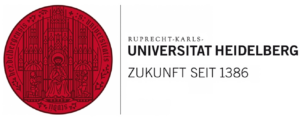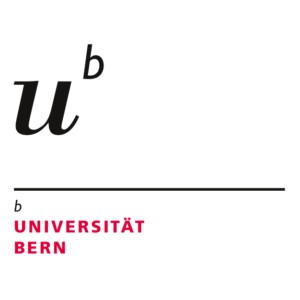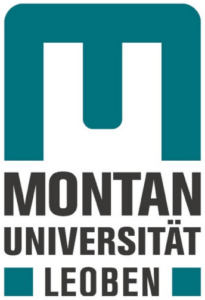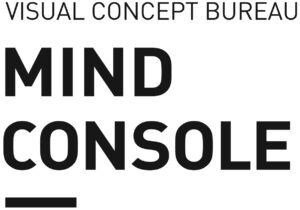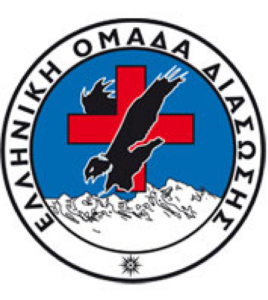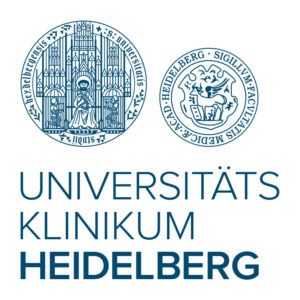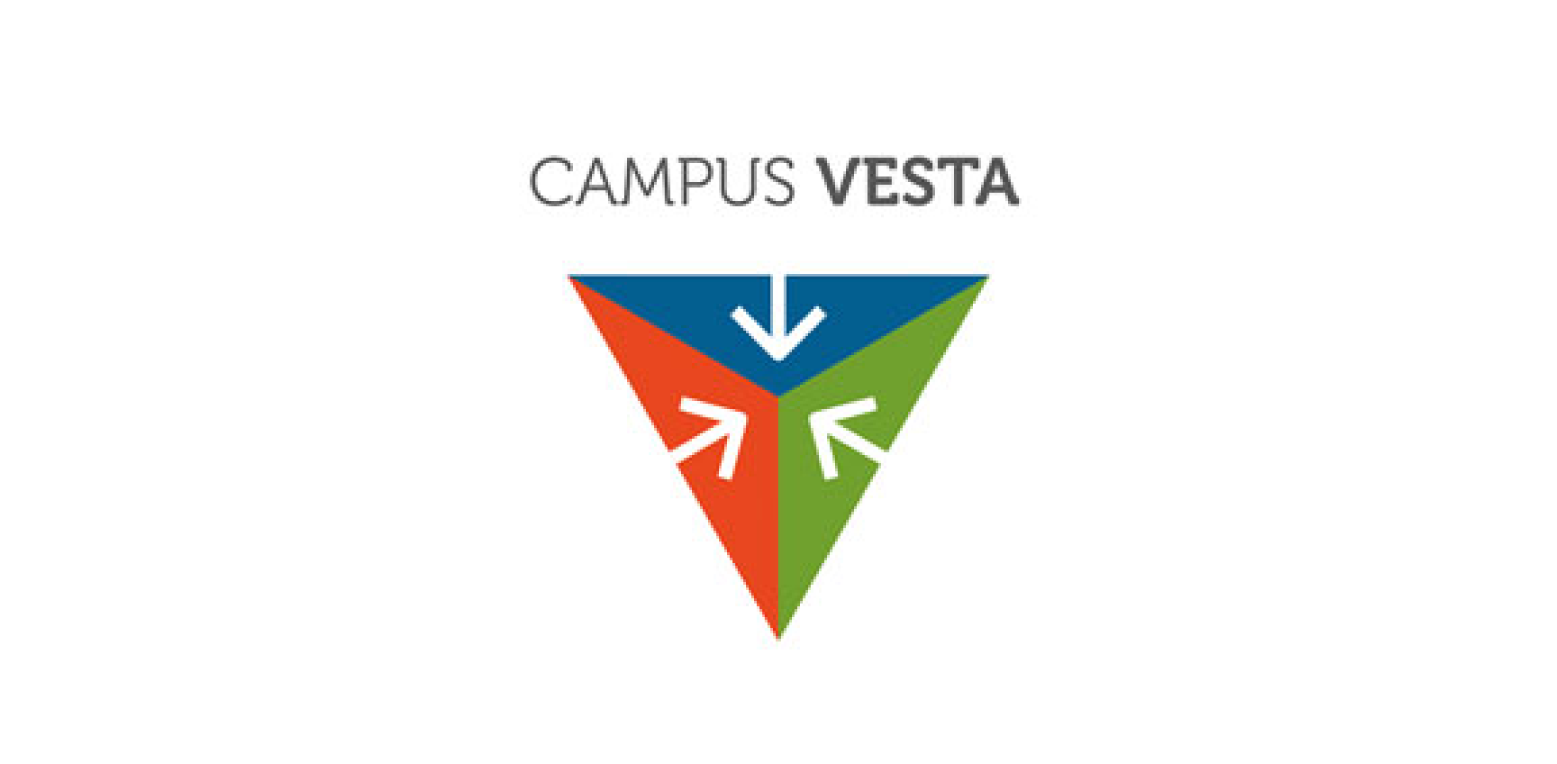Consortium
MED1stMR is a multi-disciplinary research and development project focussing on novel technologies and tools for medical first responders. The consortium was carefully formed to reach the ambitious project goals by incorporating all necessary expertise for effective execution of this 3-year project. The consortium brings together competences in the fields of Psychology and Training Science, Human Computer Interaction, Medicine, Biomedical Engineering, Computer Visualisation and Biosignal processing.
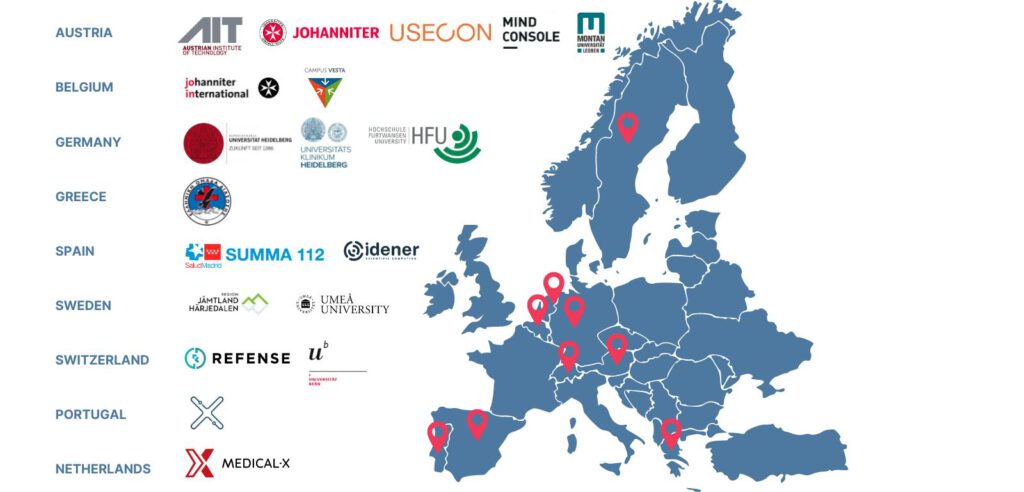
Detailed Information About The Partners
The AIT Austrian Institute of Technology is Austria’s largest research and technology organization. The Center for Technology Experience investigates enhanced forms of contextual user interaction, user experience and specific factors as distinct measures of experience quality. Based on enhanced foundational interaction thinking, research activities aim to create and measure dedicated experiences in key technology areas and application contexts to optimally align future technologies to specific user groups and different contextual situations. The Center for Technology Experience has extensive experience on augmented, mixed and virtual reality (AR, MR and VR) from several national and international projects tackling VR training for decision making under stress for public or private organisations. By combining research, business and technology expertise, the Center for Technology Experience designs ways to interact in MR efficiently and in a more natural way to improve the user’s engagement and sense of presence, providing a more stimulating and user-friendly experience and will contribute to this project by bringing its research expertise in the field of user requirements engineering, which deals with end-users needs, requirements, expectations and constraints for MR training. It will provide its expertise in participatory design sessions using methods like sketching, wireframing, virtual prototyping, co-creation and to conduct user studies and to evaluate the usability and user experience. It will provide high-quality scientific insights on human factors, technology acceptance and user experience. AIT is the coordinator of the project and acts as a central link between research, technology and business, overseeing the entire cycle in the project from requirements engineering, idea generation to agile user-centred development and market potential analysis to create a sound basis for successful post-project implementation of MR training and training concepts with enhanced realism across countries and first responder organizations. Official Website: https://www.ait.ac.at/en/ |
|
Established in 1386, Heidelberg University is Germany’s oldest university and one of Europe’s most research–intensive institutions. Heidelberg University regards itself as a research university that shapes the future while also being committed to its tradition. Its research activities are focused on the key issues of humankind as well as on basic research and its application. UHEI contributes their extensive knowledge on behavioral observation of individuals, dyads, and groups. UHEI will analyse existing training methods and compile a best practice catalogue. UHEIs goal is, to develop innovative training approaches to improve the resilience of first responders and expand this knowledge also to other domains like, sport or police work. UHEI´s role in the project is to measure human behavior in stressful and potentially hazardous situation, with special emphasis of developing and validating psycho-physiological measurement of human behavior in virtual environments. Through their extensive experience in psycho-physiological research, UHEI provides the appropriate technological equipment for psycho-physiological measurements and ensure methodically state-of-the-art procedures as well as ethical research designs in MED1stMR. Official Website: https://www.uni-heidelberg.de/en |
|
Umeå University is an university located in Northern Sweden with its faculties and has about 34 000 students enrolled. The University has an Artic Research Unit. Within the Medical Faculty, the Department of Nursing educates 1800 students and provides professional programs in nursing, specialist programs for registered nurses, a master program in nursing e.g. prehospital emergency care and doctoral studies. The Research and Development Unit for Disaster Medicine is a part of the Department of Surgery and Perioperative Sciences .This unit is where the project MED1stMR is being performed. It is a nationally well-known resource in disaster medicine, where the focus is on trauma, injury prevention and disaster medicine in the prehospital setting. Its research has been in the field of handling major incidents in extreme and challenging milieus with limited resources. The Umeå University research team has expertise in nursing, prehospital emergency care research, clinical practice, educational expertise and it has a large research network. The research team has produced several previous relevant projects such as mass casualty events in underground environment, initial emergency response to chemical disaster, as well as national courses for first responders in handling major bus- and rail/train crashes. Umeå University will be the leader of the WP 7 “Future technology assisted training and education concepts”. The University will be strengthening the knowledge, awareness and importance of novel technologies and MR training, while also developing an implementation concept for MR training setups and programs for the end users. Official Website: https://www.umu.se |
|
|
The University of Bern as a participating institution will be the emergency telemedicine at the University of Bern (UBERN) as well as the University Emergency Department at Inselspital, the University Hospital Bern. Prof. Sauter is the head of the Emergency Telemedicine at UBERN and holds an endowed professorship. UBERN in general and Profs. Sauter and Hautz in particular have considerable experience in designing and evaluating simulation trainings in acute care medicine and in research in simulation training. Their expertise specifically includes collaborative decision making in both, clinical and simulated environments and evaluation of patient outcomes with regard to health care professionals training. UBERN further currently hosts a Marie-Curie fellow researching collaborative decision making, supervised by Prof. Hautz. Dr. Birrenbach and Prof. Sauter further have extensive experience in developing and implementing VR and MR simulation trainings in acute care medicine. They are the founders of “VISL”, the Virtual Reality Insel Simulation Lab. UBERN will bring to this project the special combination of many years of clinical experience in emergency medicine, extensive experience with virtual reality in education and clinical application, and a specialisation in medical education including many years of conducting and researching simulation-based team training. UBERN will participate throughout the whole project, including needs assessment, scenario development, testing, implementation, and dissemination of the project findings. Specifically, UBERN will be responsible the development of statistical models to evaluate and aggregate team performance. Official Website: http://www.notfallzentrum.insel.ch/de/ |
|
Montanuniversität Leoben is well-known as an excellent university in Austria for its high-quality research focused along the “added value chain”, from the extraction of raw materials and their processing to material & product development. The typical research area of the MUL is mining & tunnelling technology which also includes tunnelling and the safety aspects of tunnels in the construction and operation phase. MUL is providing their scientific expertise in rescue research as well as their tunnel training facility “Zentrum am Berg (ZaB)”. The test centre at the ZaB follows the suggestion of the EU commission to increase safety of road and rail tunnels, thus the ZaB renders available motorway and railway tunnel equipped with state-of-theart installations for operating vehicle traffic as well as rails, carriages and cross passages. The ZaB serves as a reference use-case to compare MR training against real world training. The MUL provides the underground research facility Zentrum am Berg (=ZaB) which is a response to the increasing importance of underground traffic infrastructure and its safety requirements. MUL will exploit the results from MED1stMR by applying them in their training center in future trainings and conduct scientific exploitation by publishing the gathered results in top-ranked journals in their field. Official Website: https://www.zab.at/en/ |
|
Refense is a Switzerland based SME specialized in creating advanced Virtual Reality simulators for Police, First Responder and Military Training. Refense has a wide spectrum of developers and engineers to create immersive virtual reality training scenarios and the corresponding scenario builder and after action review. Refense already has partnerships on the police side of training and shares their expertise for the first responder training. Refense will develop a scenario editor and after action review with integration of third party hardware such as PLUX bio sensors and D2D manikin. Official Website: https://refense.com |
|
PLUX is a Portuguese SME specialized in advanced bio-signal monitoring platforms that integrate wearable body sensors combined with wireless connectivity, algorithms and software applications. PLUX is a Portuguese SME specialised in advanced biosignals monitoring platforms that integrate wearable body sensors combined with wireless connectivity, algorithms and software applications. PLUX has a significant track record in the creation of innovative added-value products, which include:
PLUX has a wide spectrum of engineers that cover the fields of Physics, Biomedical Engineering, Electrical and Electronic Engineering and Software development. It has strong partnerships established with different scientific institutions and sets the bridge between the academic field and the market, by applying and projecting the research know‐how to problems and practical needs, in several technological areas and different R&D and EU projects. PLUX will develop and integrate biosignals hardware and software for the Med1stMR Mixed Reality training system. The devices/systems will collect physiological variables enabling the follow-up and modelling of the psychophysiological conditions of the users. Official Website: https://plux.info/ |
|
D2D B.V, known in the market as Medical-X, is a Dutch technology driven company which develops, manufactures and sells human patient simulators for medical and military teaching and training. The realistic high-fidelity manikins allow to train in an environment that closely resembles reality. Besides the realistic looks and feel, these are also full body computerized manikins replicate the anatomy and physiology of a real patient – an achievement that changed the perception of realism in the simulation industry. Within MED1stMR D2D provides simulation products for medical teaching and training. Within the project D2D develops cutting-edge technological simulators that are cost-effective and time-efficient to teach and train clinical skills without risk to actual human patients. They are responsible for the development of a dynamic casualty simulation mannequin that provides realistic cues of the patient’s condition and responds to the actions of the trainee in VR (WP4). D2D will exploit the results of the MED1stMR project by extending their existing physical training tool (e.g. mannequins) with VR training environments. Official Website: https://medical-x.com/ |
|
IDENER is a research entity that investigates in the multidisciplinary field of Computational Science and its application to the optimization of systems and processes in key areas: KETs; Biotechnology; Energy; and Resource and Raw Materials Efficiency. This approach results in a high added value that sharpens the competitive edge of complex systems by providing improvements in performance and cost-effectiveness. To that end, IDENER integrates concepts from four interrelated and complementary areas: Mathematical Modelling and Simulation; Multidisciplinary Design Optimization; Control Engineering; and Software Engineering. The background of IDENER in previous research projects and private initiatives will allow a seamless implementation of the requested activities. Specifically, IDENER has played a similar integrator role in several European projects, being the LAWTRAIN the one with most similarities (i.e., training systems and VR platforms for security aspects). In addition, the IDENER Cybersecurity team has experience on the evaluation of platform integrity and security against cyberattacks. It also comprises experience on personal data handling for LEA’s training processes as well as for citizens privacy (e.g., Energy-related smart-meter information). In MED1stMR project, IDENER will work on the design of the IT architecture for the project software solution and the integration of different data providers/consumers (including sensors, mobile devices and VR data). IDENER will be involved in the development of in different modules, such as a training dashboard to support user friendly training administration and live performance monitoring. IDENER will support the project for questions regarding security and data protection. Official Website: https://idener.es/ |
|
USECON is an internationally active consultancy, based in Vienna that is specialized in consulting services around all activities of user-centered design of interactive systems. Human beings with all their needs, expectations and behaviors are central to our interests. The focus of all our activities are the “3 Us”: Usability – the simple usage of all complex systems and technologies User Experience – the user’s holistic, emotional experience User Interface Design – analysis, interaction strategy, conception, prototyping, graphic design USECON has an experience background of more than 500 research and industrial projects with more than 300 customers on an international scale. Beside this huge amount of activities, USECON offers special expertise in a broad area of application and technological domains. USECON, as a research spin off since more than 20 years, has a long-time experience in national and EC funded projects, especially in the domain of project coordination, project management, end user management, dissemination, communication and exploitation. Our aim is to be in the center of technology, the user and the business and bring all of this successfully together. Official Website: https://usecon.com/en |
|
Mindconsole GmbH is an Austrian creative agency founded in Graz, whose services range from development and production of AR/VR/MR solutions for industries through moving image content in 2D/3D production around the world. These interactive solutions include extensive experience in building (large-scale) 3D environments for XR applications. Engagements with our clients range from full production (concept, design, build and implementation) to the provision of specialised subcontracting services when requested. With over 10 years in the field and a wide spectrum of projects, our team has extensive knowledge in getting things done the right way. Mindconsole will use their expertise in XR with the development of a Mixed Reality Environment for medical first responder Training and the development of SDKs for the hybrid scenarios of real training tools and Mixed Reality. Our background in Information Design, User Experience and the creation of various environments as well as assets creation will be a great contribution to the team. Mindconsole will be part of the development team and creating 3D content as well as SDKs between the real training tools and the game engine of choice. Official Website: https://mindconsole.net/ |
|
Hellenic Rescue Team (HRT) is a volunteer non-profit Search and Rescue (SAR) organisation, with a human potential of 2.000 volunteers all over Greece and Headquarters in Thessaloniki. HRT participates in SAR missions in cases of urgent needs and massive disasters, either in Greece or abroad. It is acknowledged by Civil Protection Authorities in Greece and EU and a member of the United Nation – International Search and Rescue Advisory Group (UN-INSARAG). HRT provides their expertise in the organisation of aid missions in naturals and manmade disasters all over the world and their know-how in research and development in the area of search and rescue, crisis and crowd management, telecommunications as well as ICT for first responders. HRT is one of the end-user organizations involved in the project. HRT represents a volunteer, non-profit search and rescue organization. HRTs role in the project is providing insights into their expertise, access to expert knowledge and access to training-sites and participants for user evaluations. Official Website: https://www.hrt.org.gr/root.en.aspx |
|
Johanniter Österreich Ausbildung und Forschung gem. GmbH (JOAFG) was founded in 2012 by Mr. Johanniter Unfall-Hilfe in Austria (est. 1974) to professionalize research and educational activities on an European level. The core competences of this company are ambulance and patient transport with an own 24/7 call center, mobile care activities which include a mobile palliative team, home alert service and a disaster relief. The Johanniter company in Austria has employees, 600 active volunteers and 140 vehicles user for emergencies and transportation. In the year 2020, the company successfully covered 170.413 operations on the whole territory of Austria. Therefore, Johanniter is in direct contact with its primary end users who are in need of health care services, their formal as well as their informal carers (secondary end users). Since a couple of years ago, JOAFG is working on VR training for first responders in order to increase efficiency of education and training of its staff, so they could master crisis situations as well as daily routines. Additionally, JOAFG is providing aid training to roughly 11.000 people and it is educating annually up to 150 paramedics, as well as emergency medical technicians. All the experience and competence achieved throughout the years is used as a support for the MED1stMR project. The role of JOAFG in the MED1stMR is in the fields of curricula development, requirements analysis, scenario definition, piloting, evaluation, dissemination, exploitation in training of professionals and broad public. Official Website: https://www.johanniter.at/ |
|
SUMMA 112 is the Emergency Medical Service of the Community of Madrid responsible for attending all out-of-hospital emergencies throughout its vast network of human and technical resources focused on:
As an end-user organization, SUMMA staff members include emergency physicians, nurses, and technicians who are constantly involved in identifying the actual needs of first responders. In addition, SUMMA will provide active support by promoting the end-user testing procedures, identifying possible training weaknesses, and evaluating the technologies implemented at the different scenarios with the participation of accredited health experts. The Foundation for Biomedical Research and Innovation in Primary Health Care (FIIBAP) is the linked third party associated to SERMAS (Madrid Health Service) in this project. While SERMAS is the legal representative (beneficiary) of the main public medical center of the Madrid Regional Health System, SERMAS delegates authority to FIIBAP for the management and coordination of biomedical research and innovation developed in the field of primary health care. Thus, FIIBAP manages Primary Care research projects in the Madrid region, with 1299 active researchers participating in various research networks and multiple international research projects. Define the needs of first responders to develop scenarios, test new mixed reality technologies from MED1stMR project. Improve disaster training and assist with feedback to developers for training design based on the significant risks of the European population. Official Website: https://www.comunidad.madrid/hospital/summa112/ Official Website: https://www.fiibap.org |
|
Heidelberg University Hospital with its 43 specialized clinical departments and its 13 medical institutes is one of the leading medical centers in Europe. The highest standards of medical care are guaranteed by our world-renowned professors, distinguished physicians and committed nursing staff. Heidelberg University Hospital is constantly developing new methods of diagnosis and treatment the forefront of biomedical science for the benefit of all patients. UKHD is one of the end user organizations involved in the project. All end user partners represent different first responder organizations and provide a widespread competence mix, which ensures that MED1stMR targets a wide range of first responder needs. Similar UKHD is an organization of professional first responders, but interestingly a combination of police forces and medical first responders in one organization. Their role in the project is providing insights into their expertise, access to expert knowledge, access to training-sites and participants for user evaluations. Official Website: https://www.klinikum.uni-heidelberg.de/ |
|
RJH’s legal status is a County Council. Its main responsibility is primary and secondary healthcare, as well as regional development in a region of approximately 130,000 inhabitants. RHJ also works with preventative measures and dentistry. Secondary healthcare is carried out at the sole hospital in the only town of the region – Östersund Hospital – where there are 416 beds and 51 out-patient clinics . As part of RJH, the research and development unit covers education, including parts of the training for all medical personnel. The Project Centers are responsible for and collaborates mainly within EU developmental projects. They also function as a resource to internal and external project partners and acts as a networking partner in the project to transfer its results onto a larger marketplace . RJH Is an end user organization that represent professional paramedics, emergency doctors and hospital that provide insights into the needs of professional medical first responders. In addition, they are dealing with aspects of training for all medical personnel and speed up the transformation of the health care sector with the assistance of digital tools regarding products and services. Official Website: https://www.regionjh.se/ |
|
Johanniter International (JOIN) is the European partnership of 16 national charities founded by the Orders of St John. Its member organizations are active in medical services and first aid, social care, international humanitarian aid, development cooperation and disaster relief. In this regard, JOIN is working with experts from the field to find solutions and facilitate exchanges on a large scale. Based in Brussels, the JOIN Office also works with European institutions, policymakers and other international organizations, facilitating international collaboration and projects. As coordinator of a European network, JOIN aims to exchange information and strategies of health care providers in Europe and to support each other with lessons learned and expertise for new fields. Having participated as full partner in Horizon 2020 projects related to Emergency Medical Services, First Aid, Elderly Care and Cybersecurity for Hospitals, the JOIN Office assumed responsibility as Work Package leader in the areas of communication, dissemination and exploitation, engaged in designing stakeholder roadmaps, training concepts as well as data collection and research. Within the MED1stMR project, JOIN facilitates the positioning of the mixed reality training approach across Europe. In its function as coordinator of national emergency responder charities from 15 European countries, the JOIN Office offers support in requirements analysis, communication, networking, dissemination, awareness–raising and exploitation of results across Europe. Official Website: https://johanniter.org/ |
|
Campus Vesta is an institution for education, training and research for first responders, public bodies and private companies dealing with safety and security. It is an independent subsidiary of the province of Antwerp. Nearly 80 permanent staff members and more than 700 freelance lectures and instructors provide high standard safety and security education. Campus Vesta’s organization is based on two pillars:
VESTA provides their research expertise in training and training facilities and share experiences and needs in the field of medical training and/or triage during workshop and interviews. The facilities will be used to execute a field trial that serves as a reference scenario to compare MR training against real world training. Official Website: https://www.campusvestaa.be/ |
|
Furtwangen University (HFU) is a state university of applied sciences and one of the most active research universities in Baden-Wuerttemberg. In interdisciplinary research teams, we work on the latest challenges in the areas of Industry 4.0, digitalization, IT security, service engineering, medical engineering, health and healthcare, and societal changes.
HFU’s goal within MED1stMR is to develop innovative training approaches to improve the resilience of medical first responders and also to expand this knowledge to related domains like sport or police work.
Accordingly, HFU’s role within Med1stMR is to measure human behaviour in stressful and potentially hazardous situations, with a special emphasis on the development and validation of psycho-physiological measurements of human behaviour in virtual environments. Through their extensive experience in psycho-physiological research, HFU provides appropriate technological equipment for psycho-physiological measurements and methodically ensures state-of-the-art procedures as well as ethically flawless research designs.


